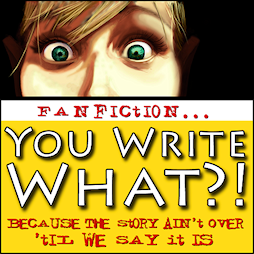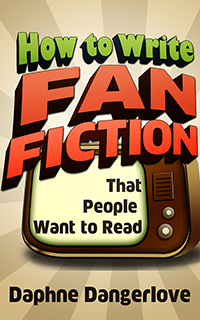If
fan fiction were its own nation, reviews would be the currency.
The
above statement is one I would venture to guess almost every author (and
probably reader) of fan fiction could agree with. Writers love it when readers
leave them a review at the end of a chapter. After all, what human doesn’t like
to receive some type of acknowledgment after working hard on something? Reviews
are a way for authors to know what people loved, what they hated, what stuck
even after the chapter ended, and whether or not the plot bunny in question
will carry out like the Energizer rabbit or fizzle away relatively quickly.
Unfortunately
reviews are also a way for authors to get hurt, to lose motivation, and
sometimes they’re one of the driving factors in an author choosing to pull and
discontinue his or her story.
I
don’t claim to be an expert on this topic by any means, and I’ll be the first
to admit I’m still relatively new to the whole fan fiction game (I only started
posting a year ago). I have been told, however, that I write good reviews that
critique without being cruel and that offer praise and suggestions when
applicable. That being said, I was more than happy to volunteer to cover this
topic. It also happens to be an area I’m pretty vocal about and that I
sometimes struggle with as a writer (I think we’ve all wanted to throw our
computers out the window after reading a scathing review).
When
it comes to reviews, there’s the good, and then there’s the bad and the ugly
(which I like to group together). There can be some good in a bad/ugly review,
and some bad/ugly in a good review, but for the most part, when I think of
reviews, a few common characteristics come to mind for each of these groups.
A
good review…
Highlights
what the reader liked.
It doesn’t have to contain paragraph after paragraph of praises for the author,
but if a certain phrase, scene, character, or moment struck your fancy, don’t
hesitate to share that! Authors always know what they liked best about a
chapter, but every time we click “post new chapter” we’re left wondering if
readers will love what we loved or if they’ll completely hate everything we’ve
written. I don’t believe in nor am I a fan of stroking someone’s ego, but it’s
nice to know that the time spent writing meant something to someone outside of
our small writing bubble.
Critiques, but
does so in a constructive manner.
I’m sure we’ve all read (and some may have even written) a scathing review in
which the author gets chewed up and spit out over grammatical errors, portions
of the plot, a character’s features, or another detail from the story. I
understand and love the fact that everyone is entitled to his or her own
opinion, but there is a respectful way to deliver that opinion, even when it
isn’t a positive one. Rather than saying something like, “This Bella is such a
spoiled bitch and if I were Edward or any other male character in the story I’d
run far, far away,” a reader could say, “Bella hasn’t exactly been the poster
child for respect when it comes to how she treats Edward. I wonder if he’ll
stay with her or if he’ll end up leaving?” Delivery is just as important as
content when it comes to reviewing, and good reviews are delivered in a tactful
manner.
Reviews the story, not the author. Making comments on a writer’s style and skills is one thing – reviewing the author’s character is entirely different. They’re not common (thank goodness!), but I have seen the occasional review that gives a rundown on the author’s character but pays no mind to the story itself. Perhaps an author has made a comment on Facebook or Twitter that you don’t agree with, or they replied to a review in a less-than-tactful manner. It’s okay to be upset, it’s okay to want to say something to them, but there is a time and a place where that is appropriate, and it’s not in the review section. A large number of fan fiction authors are also set up on some social networking site, and can be reached privately there to discuss wrong doings. In addition, popular sites such as FanFiction.net and The Writer’s Coffee Shop provide readers with the option to send authors private messages (PMs) if they choose to. The fandoms are a place where people come to enjoy something they love, not a place to foster judgment and hate. Readers and writers alike are responsible for keeping things that way.
Is passionate.
Did a
particular part of a story or a scene in a chapter leave you feeling incredibly
happy, sad, angry, or excited? Tell the author that! If a piece of writing can
elicit strong emotions from readers, it means the author is doing something
right. Readers are very quick to tell an author what he or she is doing wrong,
but it’s a far less common occurrence for us to hear when we’ve done something
that really left a mark. As always, classy review is better than a trashy one,
and being tactful in your delivery is a good thing.
A
bad/ugly review…
Is filled with
one rude sentiment after another. Spending
twenty minutes writing a review that tells the author how terrible the plot is,
how the characters are all stupid/dull/stereotypical/any other irritating
quality, how the author’s update schedule isn’t what the reader wants, etc.
etc. is not only rude, but it’s also not tasteful at all. Just because someone
posts their work and puts everything out there does not mean readers have the
right to be disrespectful. If you’re filled with that much hatred for a particular story, perhaps it’s best to
simply stop reading.
Is written
with the intention of hurting the author. Wait, what’s that you say? You don’t like a
particular author? You don’t like the person who betas a story? So what? Move
on! Don’t spend your time composing a deliberately nasty review simply because
you dislike the individual behind the story. Find a different story to read or
connect with an author that you do like. By composing a vile review, you’ve
done nothing but caused an author to waste a minute reading the review and
another five or ten minutes stewing over it, and you’ve wasted your own time
that could have been spent doing something more constructive or enjoyable.
There are thousands of stories from hundreds of fandom’s out there to read. Why
spend even a minute being callous when you could be busy falling in love with
one of them?
Are demanding.
Telling an
author to “please update soon” is one thing. Demanding that they “update or I
won’t read this story anymore” is completely bogus. Fan fiction authors write
for free. They take time out of their schedules (some of which are already jam
packed) to work on and post stories that readers can enjoy. They aren’t
required to post a specific number of words or chapters at a set frequency.
Each and every one of us has a life outside of the realm of fan fiction.
Authors and readers are also students, professionals, parents, husbands, and
wives, and have daily activities to attend to. Be patient. If you’re curious
about the status of a particular story, send the author a message or a tweet.
If you feel like you just can’t wait anymore, put the story on alert, add it to
your list of fics to be read in the future, and move on to the next piece.
Providing an author with nonstop proverbial kicks in the ass usually does not
have a positive or desired effect on the story.
Tells the
author how to write the story. These
reviews may very well be some of the most infuriating ones authors have to
read. Our stories are like our babies; we all work hard to craft a set of
characters and a plot line that we can fill with scenes and situations our
minds dream up. To have a reader come along and tell us that something should
have happened a different way or that two characters should not be in a
relationship with one another is the last thing we want to hear. It’s even more
difficult to stomach it when the reviewer has never written anything of his or
her own. In a perfect world, everyone who wanted Joey to end up with Dawson
could have pushed a button on his or her remote to hand-craft an alternate
ending. Unfortunately that was not how the writers of Dawson’s Creek wanted things to come to an end, and it was their
story to tell, not the audience’s to write. Be respectful of the creativity
people choose to share with you. And if you really want to see a fic where
Bella ends up with Jacob and Edward falls off a cliff … open your word
processing program and start writing! The fan fiction universe is an
ever-expanding one, and we’re always happy to accept new writers!
This
list could go on and on, and I’m sure that some of you will have more to offer
up down in the comments section on the post. But for those who are new to the
game – or even those who are seasoned veterans – I think this is a good place
to start.
Reviews
are a touchy subject for most, but they don’t always have to be. With a little
time, attention, and some TLC, readers can craft reviews that not only express
their thoughts on a story, but also provide the author with some constructive
criticism, and maybe even include a few humorous points as well!
I’ll
leave you with my definition of the “3 R’s”: read, review, and most
importantly, respect.
Happy
reviewing!
Author:
Nikki Storebo, Guest Blogger
















